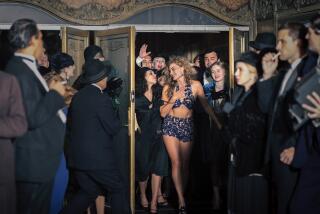APPRECIATIONS : Ruby Keeler: Bidding Farewell to a Cheerfully Optimistic Trouper
- Share via
Thanks to film societies, revival houses, television and cassettes, those spectacular and delightfully corny musicals of the early 1930s have had a remarkable afterlife. Young people whose parents had not even been born when the musicals first appeared have come to love the singing stars and the character actors who filled the time between Busby Berkeley’s charmingly campy dance numbers, with their platoons of fair ladies forming surprisingly sexy symmetries in and out of the water and beside waterfalls.
So it was that Ruby Keeler, who died on Sunday at the age of 83, had had a wonderful afterlife too. She had not starred in a film in more than a half-century but she was a timeless heroine to millions who loved “42nd Street,” “Gold Diggers of 1933” and the other pictures in which her most frequent co-star was the boyishly handsome Dick Powell.
In more recent years, after her triumphant return to the stage in a revival of “No, No Nanette” in 1971, she had been slowed by a stroke, but she remained a trouper, turning out to receive the continuing accolades that came her way.
Not long ago, the Santa Barbara Civic Light Opera produced a fund-raiser in the form of a musical tribute to her, including a fine re-creation of a dance number from “42nd Street.” Keeler sat in a chair at one side of the stage and, laughing, made a brief, brave show of moving her feet in time to the music, as if the urge to dance could not be stilled. She brought the house down.
She was honored at the Palm Springs Film Festival and at an evening in Los Angeles a year ago remembering Al Dubin, the lyricist who co-authored several of the songs she sang in the movies. She was cheerful and enthusiastic, and you felt that the standing ovations were consolations of a sort for the cane and the infirmities, which she seemed to accept with a philosophical tranquillity.
Then again, Keeler appeared always to be what she often portrayed on the screen: the cheerfully optimistic trouper, with both her aspirations and her underlying values in place.
She survived a stormy marriage to Al Jolson, whose best friends would not deny he was a difficult man. But after the tumults of the Hollywood and Jolson years she married again, very happily, to developer John Lowe, living in Southern California, raising their four children, driving the car pools and enjoying life well out of the limelight.
When the renewal of admiration for the old Warner musicals led to a renewed fame and admiration for Keeler, and with the children grown, she returned to the bright lights for what was really an extended farewell tour, a chance for the fans from two or three generations to see her in person and, in effect, say thanks for the memories. The performances in “No No Nanette” were also, of course, an inspiring demonstration that life can as well begin at 60-plus as at 40.
In those films of the ‘30s, Keeler somehow embodied a youthful ingenuousness, a kind of perky innocence that also marked the young movies and a young society (even in a Depression to which the musicals supplied a temporary but relieving antidote).
Those of us senior enough to remember her from the first time around can be glad she had the recognition she deserved. But, in mourning her, it is possible to mourn as well the fading of that wider, youthful ingenuousness and optimism that marked Ruby Keeler’s singing, dancing days.
More to Read
The biggest entertainment stories
Get our big stories about Hollywood, film, television, music, arts, culture and more right in your inbox as soon as they publish.
You may occasionally receive promotional content from the Los Angeles Times.










